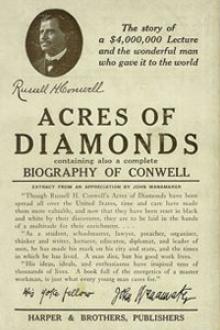Acres of Diamonds - Russell H. Conwell (big screen ebook reader .txt) 📗

- Author: Russell H. Conwell
- Performer: 1599869802
Book online «Acres of Diamonds - Russell H. Conwell (big screen ebook reader .txt) 📗». Author Russell H. Conwell
Young man, the history of the breaking up of the trusts by that attack upon “big business” is only illustrating what is now the opportunity of the smaller man. The time never came in the history of the world when you could get rich so quickly manufacturing without capital as you can now.
But you will say, “You cannot do anything of the kind. You cannot start without capital.”
Young man, let me illustrate for a moment. I must do it. It is my duty to every young man and woman, because we are all going into business very soon on the same plan. Young man, remember if you know what people need you have gotten more knowledge of a fortune than any amount of capital can give you.
There was a poor man out of work living in Hingham, Massachusetts. He lounged around the house until one day his wife told him to get out and work, and, as he lived in Massachusetts, he obeyed his wife. He went out and sat down on the shore of the bay, and whittled a soaked shingle into a wooden chain. His children that evening quarreled over it, and he whittled a second one to keep peace. While he was whittling the second one a neighbor came in and said: “Why don’t you whittle toys and sell them? You could make money at that.” “Oh,” he said, “I would not know what to make.” “Why don’t you ask your own children right here in your own house what to make?” “What is the use of trying that?” said the carpenter. “My children are different from other people’s children.”
(I used to see people like that when I taught school.) But he acted upon the hint, and the next morning when Mary came down the stairway, he asked, “What do you want for a toy?”
She began to tell him she would like a doll’s bed, a doll’s washstand, a doll’s carriage, a little doll’s umbrella, and went on with a list of things that would take him a lifetime to supply. So, consulting his own children, in his own house, he took the firewood, for he had no money to buy lumber, and whittled those strong, unpainted Hingham toys that were for so many years known all over the world. That man began to make those toys for his own children, and then made copies and sold them through the boot-and-shoe store next door. He began to make a little money, and then a little more, and Mr. Lawson, in his Frenzied Finance says that man is the richest man in old Massachusetts, and I think it is the truth. And that man is worth a hundred millions of dollars to-day, and has been only thirty-four years making it on that one principle—that one must judge that what his own children like at home other people’s children would like in their homes, too; to judge the human heart by oneself, by one’s wife or by one’s children. It is the royal road to success in manufacturing. “Oh,” but you say, “didn’t he have any capital?” Yes, a penknife, but I don’t know that he had paid for that.
I spoke thus to an audience in New Britain, Connecticut, and a lady four seats back went home and tried to take off her collar, and the collar-button stuck in the buttonhole. She threw it out and said, “I am going to get up something better than that to put on collars.” Her husband said: “After what Conwell said to-night, you see there is a need of an improved collar-fastener that is easier to handle. There is a human need; there is a great fortune. Now, then, get up a collar-button and get rich.” He made fun of her, and consequently made fun of me, and that is one of the saddest things which comes over me like a deep cloud of midnight sometimes—although I have worked so hard for more than half a century, yet how little I have ever really done.
Notwithstanding the greatness and the handsomeness of your compliment to-night, I do not believe there is one in ten of you that is going to make a million of dollars because you are here to-night; but it is not my fault, it is yours. I say that sincerely. What is the use of my talking if people never do what I advise them to do?
When her husband ridiculed her, she made up her mind she would make a better collar-button, and when a woman makes up her mind “she will,”
and does not say anything about it, she does it.
It was that New England woman who invented the snap button which you can find anywhere now. It was first a collar-button with a spring cap attached to the outer side. Any of you who wear modern waterproofs know the button that simply pushes together, and when you unbutton it you simply pull it apart. That is the button to which I refer, and which she invented. She afterward invented several other buttons, and then invested in more, and then was taken into partnership with great factories. Now that woman goes over the sea every summer in her private steamship—yes, and takes her husband with her!
If her husband were to die, she would have money enough left now to buy a foreign duke or count or some such title as that at the latest quotations.
Now what is my lesson in that incident? It is this: I told her then, though I did not know her, what I now say to you, “Your wealth is too near to you. You are looking right over it”; and she had to look over it because it was right under her chin.
I have read in the newspaper that a woman never invented anything. Well, that newspaper ought to begin again. Of course, I do not refer to gossip—I refer to machines—and if I did I might better include the men. That newspaper could never appear if women had not invented something. Friends, think. Ye women, think!
You say you cannot make a fortune because you are in some laundry, or running a sewing-machine, it may be, or walking before some loom, and yet you can be a millionaire if you will but follow this almost infallible direction.
When you say a woman doesn’t invent anything, I ask, Who invented the Jacquard loom that wove every stitch you wear? Mrs. Jacquard. The printer’s roller, the printing-press, were invented by farmers’ wives. Who invented the cotton-gin of the South that enriched our country so amazingly?
Mrs. General Greene invented the cotton-gin and showed the idea to Mr. Whitney, and he, like a man, seized it. Who was it that invented the sewing-machine? If I would go to school to-morrow and ask your children they would say, “Elias Howe.”
He was in the Civil War with me, and often in my tent, and I often heard him say that he worked fourteen years to get up that sewing-machine.
But his wife made up her mind one day that they would starve to death if there wasn’t something or other invented pretty soon, and so in two hours she invented the sewing-machine. Of course he took out the patent in his name. Men always do that. Who was it that invented the mower and the reaper? According to Mr. McCormick’s confidential communication, so recently published, it was a West Virginia woman, who, after his father and he had failed altogether in making a reaper and gave it up, took a lot of shears and nailed them together on the edge of a board, with one shaft of each pair loose, and then wired them so that when she pulled the wire one way it closed them, and when she pulled the wire the other way it opened them, and there she had the principle of the mowing-machine. If you look at a mowing-machine, you will see it is nothing but a lot of shears. If a woman can invent a mowing-machine, if a woman can invent a Jacquard loom, if a woman can invent a cotton-gin, if a woman can invent a trolley switch—as she did and made the trolleys possible; if a woman can invent, as Mr.
Carnegie said, the great iron squeezers that laid the foundation of all the steel millions of the United States, “we men” can invent anything under the stars! I say that for the encouragement of the men.
Who are the great inventors of the world?
Again this lesson comes before us. The great inventor sits next to you, or you are the person yourself. “Oh,” but you will say, “I have never invented anything in my life.” Neither did the great inventors until they discovered one great secret. Do you think it is a man with a head like a bushel measure or a man like a stroke of lightning?
It is neither. The really great man is a plain, straightforward, everyday, common-sense man.
You would not dream that he was a great inventor if you did not see something he had actually done.
His neighbors do not regard him so great. You never see anything great over your back fence.
You say there is no greatness among your neighbors.
It is all away off somewhere else. Their greatness is ever so simple, so plain, so earnest, so practical, that the neighbors and friends never recognize it.
True greatness is often unrecognized. That is sure. You do not know anything about the greatest men and women. I went out to write the life of General Garfield, and a neighbor, knowing I was in a hurry, and as there was a great crowd around the front door, took me around to General Garfield’s back door and shouted, “Jim!
Jim!” And very soon “Jim” came to the door and let me in, and I wrote the biography of one of the grandest men of the nation, and yet he was just the same old “Jim” to his neighbor.
If you know a great man in Philadelphia and you should meet him to-morrow, you would say, “How are you, Sam?” or “Good morning, Jim.”
Of course you would. That is just what you would do.
One of my soldiers in the Civil War had been sentenced to death, and I went up to the White House in Washington—sent there for the first time in my life to see the President. I went into the waiting-room and sat down with a lot of others on the benches, and the secretary asked one after another to tell him what they wanted.
After the secretary had been through the line, he went in, and then came back to the door and motioned for me. I went up to that anteroom, and the secretary said: “That is the President’s door right over there. Just rap on it and go right in.” I never was so taken aback, friends, in all my life, never. The secretary himself made it worse for me, because he had told me how to go in and then went out another door to the left and shut that. There I was, in the hallway by myself before the President of the United States of America’s door. I had been on fields of battle, where the shells did sometimes shriek and the bullets did sometimes hit me, but I always wanted to run. I have no sympathy with the old man who says, “I would just as





Comments (0)